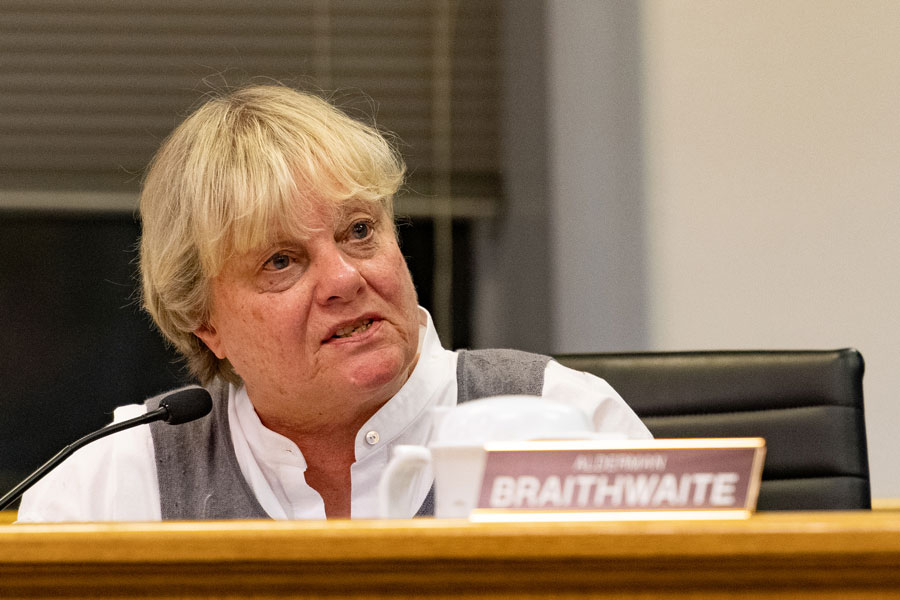Human Services Committee reviews crisis response services
Daily file photo by Noah Frick-Alofs
City residents objected to a 4.9% tax increase during a recession at Monday’s City Council meeting
August 17, 2020
Evanston’s Human Services Committee reviewed programs the city uses to respond to 911 calls for services during a Monday meeting. The conversation was a continuation of other discussions surrounding the movement to defund the police.
The Evanston Police Department’s victim services program provides a 24-hour crisis response seven days a week, according to Victim Services Advocate Ariel Jackson. When the department is notified of a crisis, victims are usually allowed to choose whether a crisis advocate will respond to their call. Crisis advocates also may accompany or take the place of a victim in court once a case is charged. If victims are listed in police reports, crisis advocates respond.
“We go through every single report every single day and make phone calls to those victims, whether they want to follow up or not, just to ensure that they’re getting the services needed, that they are in touch with the right officer, they’re in touch with the right detective (and) they understand the process,” Jackson said.
The Evanston/North Shore YWCA also provides crisis resources, including prevention and response work for youth, a 24-hour crisis line, emergency shelter, both transitional and long term housing, and free counseling for residents and community members. Staff at both Impact Behavioral Health Partners and the James B. Moran Center for Youth Advocacy also provide services, but mostly for those who already participate in their programs.
Programs serving people experiencing homelessness, such as Connections for the Homeless and Interfaith Action of Evanston, also help respond to individuals in crisis. Their work is also usually limited to people in their programs. As for those outside of the programs, individuals working with those experiencing homelessness have also worked with the police department in de-escalation and mental health training.
“We’re responding to crises in our programs all the time, but we do have a two-person outreach team who does street outreach, and we do our best to respond in a timely manner when we receive calls,” said Betty Bogg, executive director of Connections for the Homeless. “But it is certainly not a situation where someone’s in a fight on a street corner and we can show up… We do not have the capacity for that kind of emergency response.”
NorthShore University HealthSystem also comes across patients in crisis, whether they are self-directed or referred by either emergency medical services or the police department. Patients receive a medical screening exam to make sure they do not have underlying medical conditions. If no condition exists or it is determined that the person may be evaluated from a psychiatric standpoint, crisis social workers are called in to do an evaluation, according to Ernest Wang (Feinberg ’95, ’99), the hospital’s chief of emergency medicine.
Wang also emphasized that some mental health patients end up staying in the hospital for long periods of time. To fix that, Wang proposed a psychiatric medical home dedicated solely to these patients, which has been done in the Bay Area.
“Boarding of behavioral health patients is truly a national crisis, and we’re seeing more and more of it in our emergency department with longer and longer lengths of stay, which not only is bad for the patients, but also bad for our staff, and for other patients that need emergency care,” Wang said.
PEER Services, which provides substance abuse prevention and treatment, does crisis phone work and works with patients from other programs who have requirements pertaining to substance abuse, according to Executive Director Maureen McDonnell (Weinberg ’84).
Along with working with people already in crisis, McDonnell said she hopes PEER Services can reach those who may be at risk of having a crisis, as well as following up after a crisis happens.
“My top recommendation, you know, as you all are rethinking how to balance out crisis intervention and crisis management in Evanston, is that we need the good work that’s done in the immediate, but there also needs to be a really sustained follow up of some kind… whether that’s done by nonprofits or whether that’s done by the city,” McDonnell said.
Ald. Judy Fiske (1st) expressed gratitude for these programs and an interest in strengthening the services available in Evanston. She also said the conversation was well overdue.
“It sounds like we’ve got the resources, and the personnel that’s out there is just incredible,” Fiske said. “We look at this as the glass half full, because now we’re dealing with issues that we probably should have been talking about for a long time.”
Email: [email protected]
Twitter: @juliaa_grace
Related Stories:
— Human Services Committee reviews police services and response models in hopes of moving towards defunding


